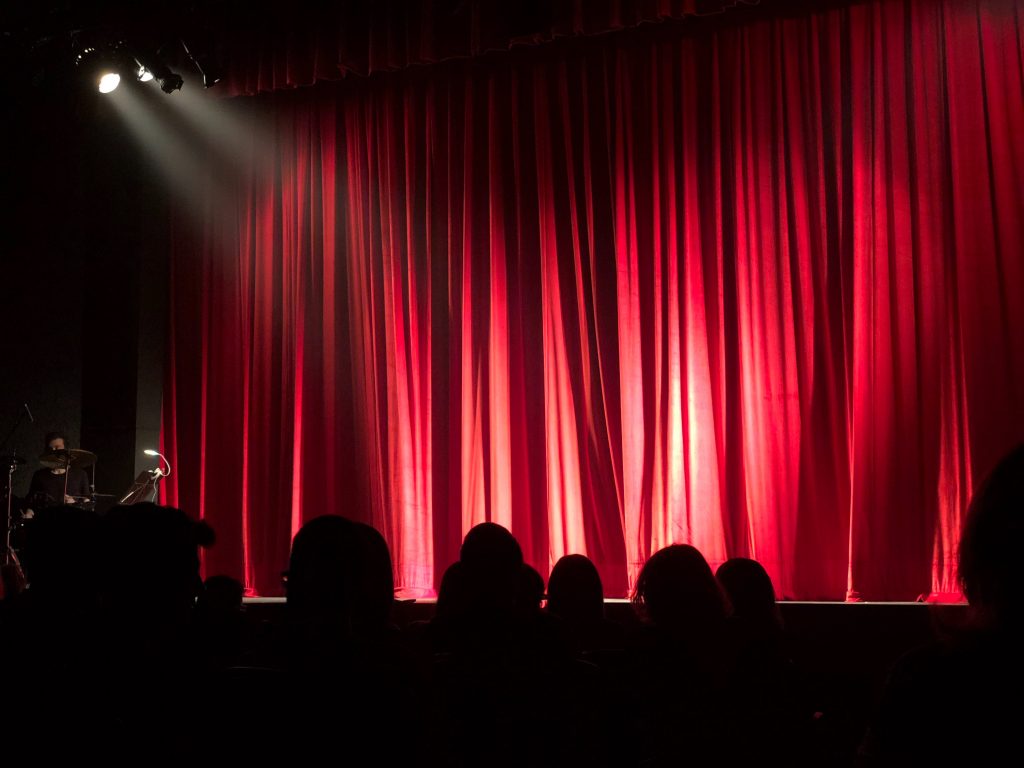On a crisp November morning, I began a walk that I have gone on hundreds of times over the last fifteen years: the seven minute stroll from my home to Ranga Shankara (RS), one of Bangalore’s – and perhaps India’s – best-known theatre venues. As I walked, I thought of my own unique and ever-changing relationship with the space. The first time I went to RS was as a child of 13, to attend their summer theatre workshops. Since then, over the years, I’ve had the privilege to engage with the space as a theatre actor, storyteller, ticket checker, sabudana vada eater and, most often and most importantly, an enthralled audience member. But this time, I was going to speak to the people whose work kept ‘Theatre Alive!’ – a phrase Ranga Shankara has offered as its rallying cry since it first opened its doors in 2004. I had always known that it took many, many tireless workers to keep the place going, and I was excited to know them and introduce them to you.
Over a few hours on a Tuesday – the first day of their work week – I spoke to people who had worked at Ranga Shankara for only a few months, to those who had been with Sanket Trust (the organization that administers Ranga Shankara) before RS was even conceptualised. I had conversations about the importance of the theatre (both the building and the literally thousands it has played host to), the way theatre making and audiences have changed over the years, and what it takes to keep an edifice of this size and scale running to audiences (almost) every single day of the year. A common thread across all my conversations was a rueful declaration of not having watched any or many plays. Work picks up for everyone right before the performance, and leaving stations unattended is difficult for many of my interviewees. These conversations primarily happened in Kannada and Hindi, but I do my best in this essay (and the next) to capture as much as I can in English. Fair warning: I use Hindi and Kannada words with context whenever required. Look them up!
Even before you enter the auditorium – the main performing venue; before you climb the sweeping staircase peppered with quotes from Shakespeare’s work – your eye is drawn to a few prominent spaces on the ground floor.
The first is Anju’s Cafe. Even on a Tuesday morning, chatter fills the space; patrons are enjoying akki rotis and tea or coffee. And two people are behind the spacious cafeteria counter, calmly handling orders and whipping up treats double quick. They are Srinivas and Ganesh. They both tell me of the long years they’ve spent working with Anju’s café, which has had branches at other major cultural institutions in the city. Indeed, Ms. Angela Sudarshan (aka Anju), was once the Theatre caterer extraordinaire, but that’s a whole different story I will maybe write someday.
Srinivas and I talked about how he moved from Mandya, and the shock of Bangalore even though it’s been 17 years since.. He told me how much he enjoyed making sabudana vadas (and I told him how much I enjoyed eating them!) He was the first (of many) to tell me about the luxuries of working in a job that requires conversations with so many different kinds of people. I loved hearing about his excitement on seeing Mukhyamantri-avaru (the Kannada actor turned politician Chandrashekar) and Ramesh sir (Kannada film actor Ramesh Aravind) frequenting the cafe.
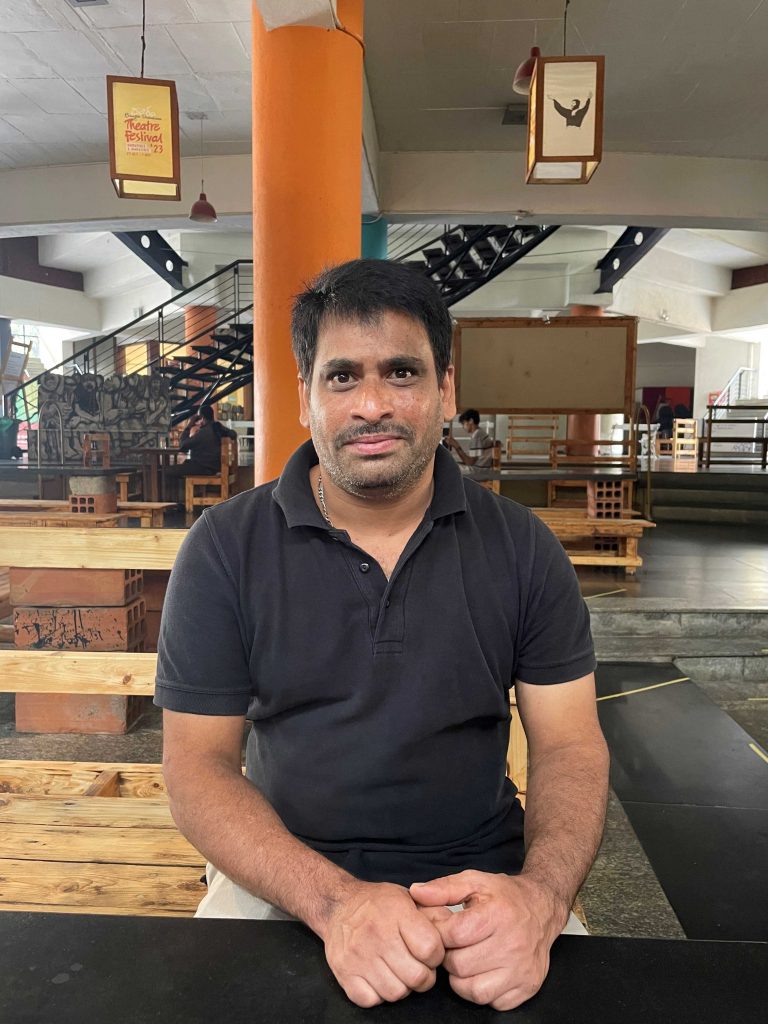
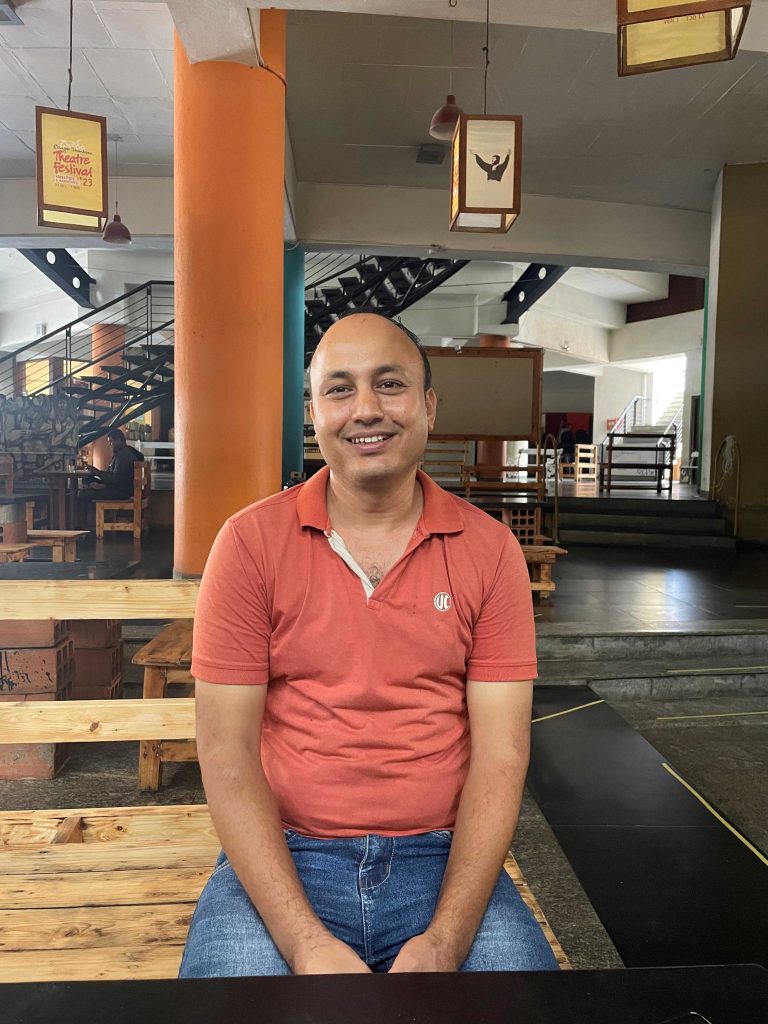
Ganesh’s tryst with RS also started with a big-ger move. He moved from a village in Uttarakhand to Bangalore. His uncle was working with Anju, and recommended that he come to Bangalore for work. When he was a child, he dreamt of joining the army – a popular aspiration for the children of his village. We both agreed that serving the country was a big and difficult job indeed, and then quickly moved on to lighter matters. Ganesh told me about watching scenes while actors rehearsed, another recurring theme across interviews. When you have a space to run, and patrons requiring constant attention, it is often just a few scenes of a play that you are able to watch while doing the dishes or totalling up a bill.
After downing my delicious chai and leaving Srinivas and Ganesh to their hungry lunchtime crowd, I ambled across to Paperback, the lovely bookstore nestled in a corner of Ranga Shankara foyer. I had a lovely conversation with Jalevana, who has been running the bookshop for the last year and a half. We spoke of Haruki Murakami and S.L Bhyrappa, their best-selling authors in English and Kannada respectively. We also talked about fiction selling much more than non-fiction (I wasn’t surprised) and a number of the plays in publication that the bookstore housed for actors, directors and other theatre enthusiasts. He recalled meeting Vasuki Vaibhav (a composer who works primarily in Kannada) at the bookshop adding hurriedly that the number of different and interesting people – not just the celebrities! – he meets on a day to day basis is one of the best parts of the job. I will confess that I pored over the new arrivals for more than a few minutes before I remembered that there were a few more people I needed to speak to before prancing up the grand staircase to the audi.
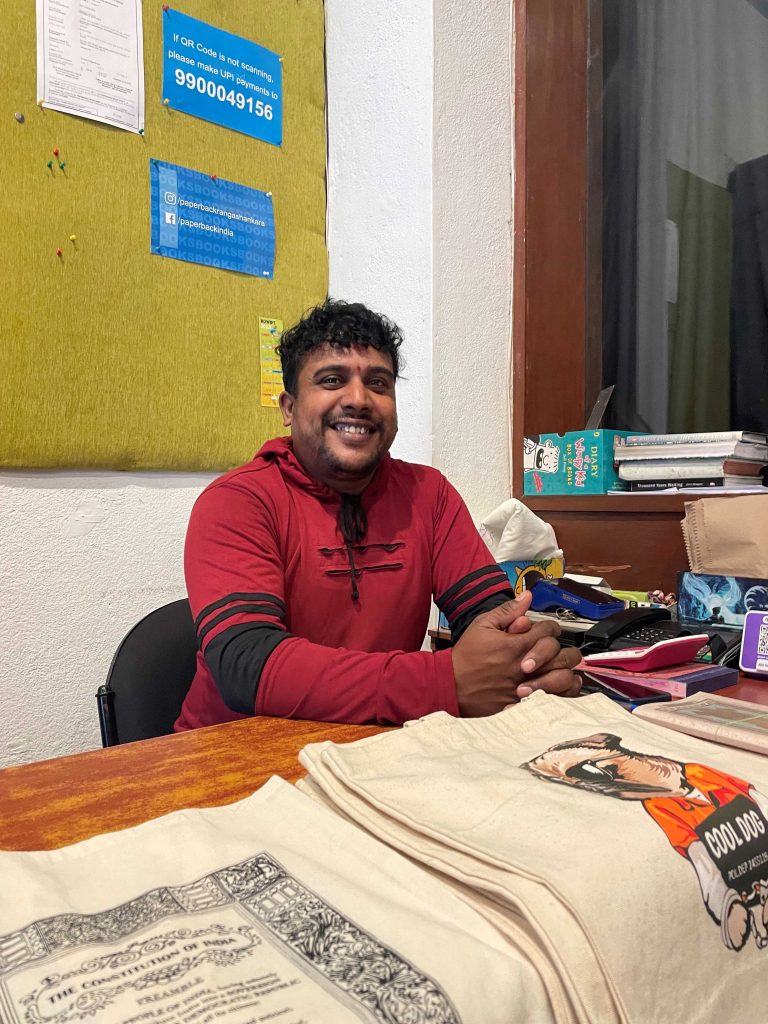
One of them was Srinivas at the Box Office. He has been working at Ranga Shankara since 2000, four full years before the theatre was operational! He had a really difficult time choosing a favourite play. After some prodding, I managed to pin him down to Odakalu Bimba (written by Girish Karnad, performed by Arundhati Nag). I haven’t watched it, but I’ve heard so many things. I wish it was still running. The opening run had Ms. Nag perform it in Kannada and Arundhati Raja (who co-founded and runs Jagriti, the other theatre person’s theatre in Bangalore) perform it in English.
I digress.
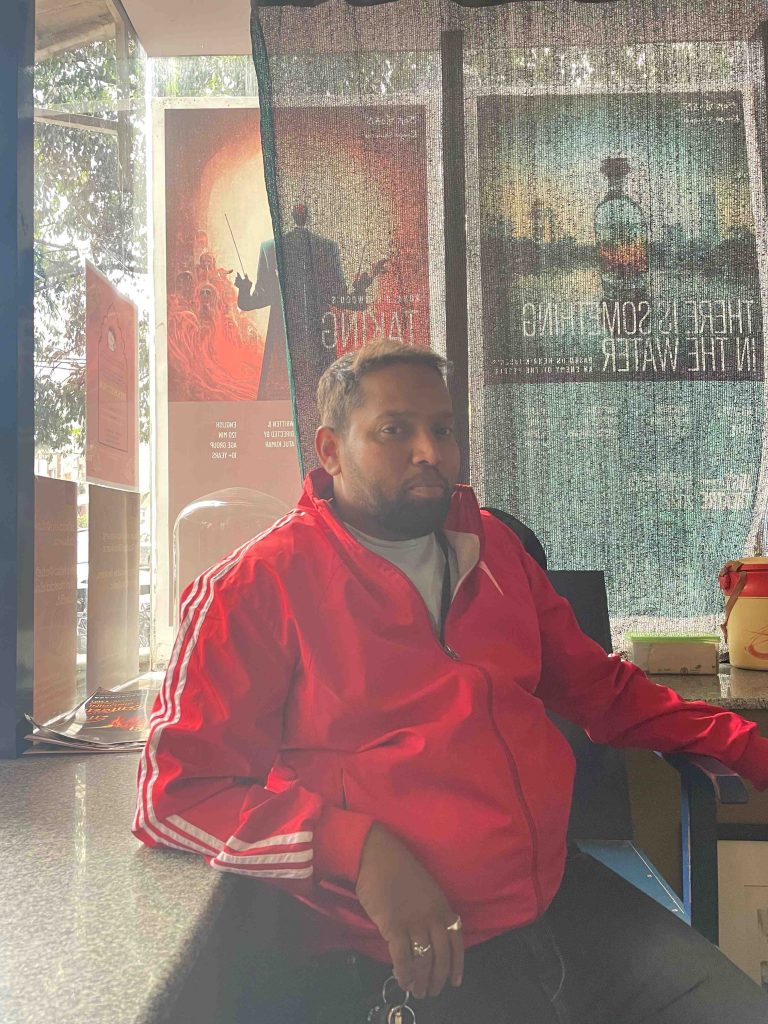
Srinivas and I found ourselves talking about the pandemic. He was not the only staff member to tell me that he was fully supported by the management at Ranga Shankara through those difficult months. I was very heartened to hear this. As the conversation wound to a close, we were interrupted by the day’s production manager – coordinating a show from Ninasam (the prestigious drama school in Heggodu, Karnataka) – coming to check on ticket sales. I smiled to hear them talk about how great the play was, and what else they could to get sales numbers up. Looks like the same conversation was happening in many rooms all the time.
Finally, I spoke to the two wonderful security guards who were on the morning shift. Sekhar who is the supervisor, and Abul, who was the guard on duty, were both posted to RS a couple of months ago. Sekhar told me about how he loved the theatre as a child. He reminisced about the costumes and make up, and his favourite role of Narada in the local tent performances in Kadrenahalli (now in south Bangalore). We also got talking about how important the job of security is in running a large space. Abul, who had been curiously – and vigilantly – watching me flit around Ranga Shankara was hesitant to sit and talk. Once we began however, he told me about growing up in Assam and how his friends told him about security work here. We talked about the different Bangla plays he watched as a child. Now however, in that oft-repeated refrain, work is busy and he doesn’t get to watch any plays.
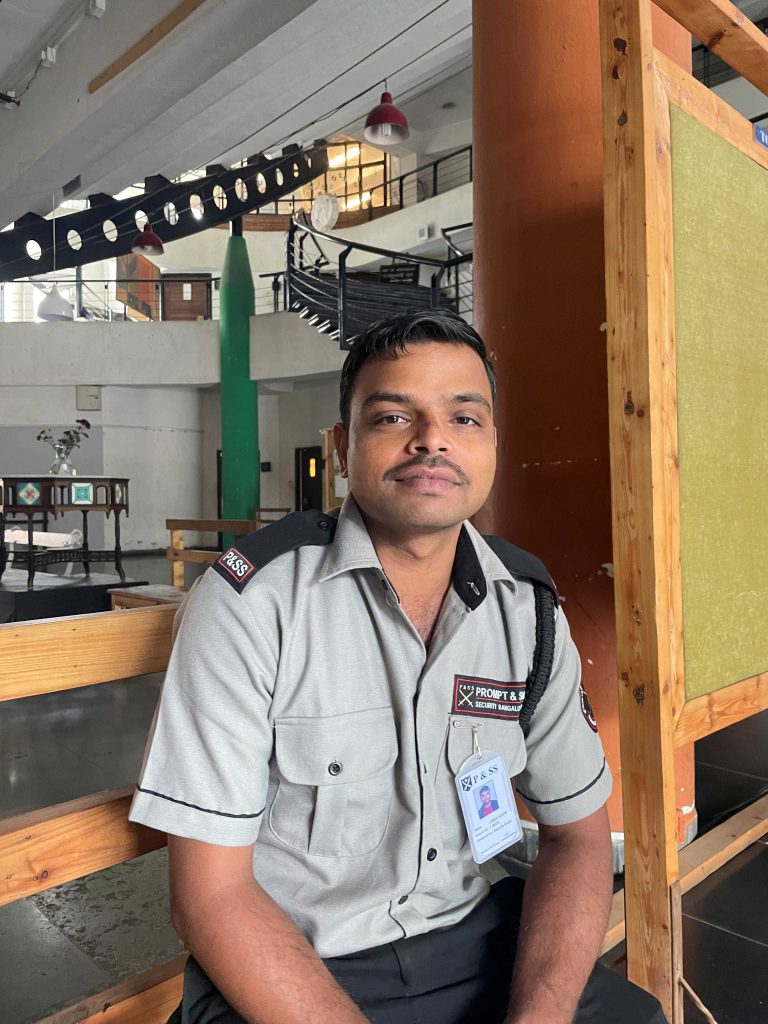
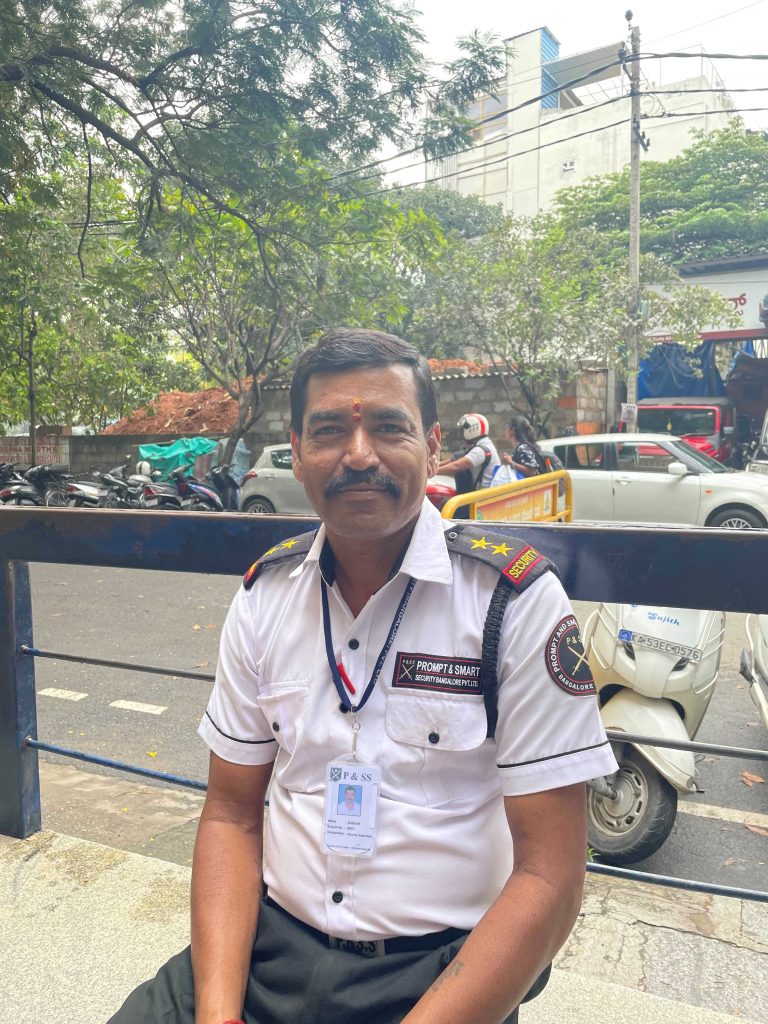
After these conversations, and before I went upstairs, I found myself looking at this outside space anew. It requires so many people working silently in tandem. And I was suddenly very aware of how little I knew of them, how little an effort I had made to get to know them, these people who hold this space for us – audience, book lover, eater-and-drinker, and performer alike. Ranga Shankara is beautiful for its open-plan entrance, there is no door or gate to enter and meet these people, and the others who frequent it. As I walk up the staircase to meet the rest of the staff, I invite you to plan to make full use of this open-plan. And say hello to the people you’ve met on this page.
Until next time.
This essay is the first of a two-part series. The next piece will be published in two weeks, right here.





